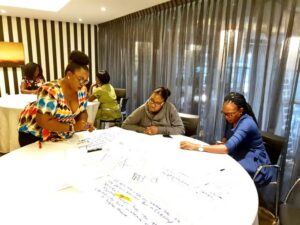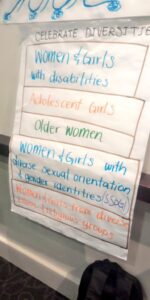It was a chilly morning as my cab driver Steven drove me to the airport. My folder containing workshop documents fell on the floor and caught Steven’s attention. While putting the documents back in the folder, he commented rather confidently, “Madam, why does your folder have BLTG? Is it not illegal to have things that clearly represent the LGBTIQ community?”. My first impulse was that this person clearly knew what LGBTIQ was; he knew the full acronym; and that there is a community of LBGTIQ. So many thoughts crossed my mind and I did not want to make any assumptions.
I thought to myself, I am a feminist, a strong feminist, a feminist who is determined to transform our society, to rid our society of shame about those who are different, and to rid our society of intolerance and to promote acceptance and love. Rather than ask Steven questions, I decided to start the conversation about diverse sexual orientations and gender identities and how people with different sexual orientation and gender identity than what we consider the norm are also entitled to all human rights because they are human. Steven assured me that his culture and religion considered anything other than heterosexuality unacceptable. I asked him about his personal perspective and it was amazing to hear him express his inner convictions. Steven told me he believed that all human beings are equal and it is alright for people to be diverse in their sexualities and gender identities, but that the illegality of difference is an issue of negative social norms.
In such short a ride from Kampala to Entebbe airport, we had such an amazing in-depth discussion by which we were both clear that all human beings are entitled to human rights and freedoms. But there was one thing I was still holding back from Steven, and that is the BLTG acronym he had seen on the folder. I told him that the BLTG is an acronym for Build Local and Think Global for which I was going to attend a deep dive workshop in Cape Town, South Africa, on inclusive GBV Programming in Emergencies. I told Steven that I am part of the BLTG Initiative with other members who are engaged in a global, multi-agency initiative that aims at promoting women’s transformative leadership in Gender Based Violence (GBV) Emergency Preparedness and Response. We are feminist, women’s rights, grassroots organizations, activists, academics, national-regional and network organizations working in emergencies and fragile contexts and committed to the protection and empowerment of women and girls. Steven was excited to learn about both BLTG and LGBTIQ. It is always encouraging to meet one person here and there who actually thinks differently and possibly walks against the grain amidst the ocean of suffocating social norms.
Arriving in Cape Town, my heart was filled with joy to see amazing women coming together for a noble cause. The BLTG Deep dive workshop underscored creating inclusive environments for ALL women and girls within GBV emergency response programming so as to improve and increase accessibility, inclusion, safety and security in GBV prevention activities or response services. One of the most interesting discussions was when Gina emphasized that we should never just head to the field in an emergency seeking to identify women or girls with diverse sexual orientations, as this could put them at extreme risk. Instead, we focused on our role as service providers to make our services accessible and welcoming for all women and girls with different diversities.

Jennate emphasized that as GBV service providers, we need to create awareness, encourage discussion, celebrate diversity, and promote and support action that is inclusive for all women and girls. This struck a cord with most participants because Jennate called us to personally examine our unconscious bias that influences excluding of women and girls from different ethnicities and religious denominations. It was clear to us all that even though inclusion is at the forefront of what we do, we all harbour unconscious bias by focusing on women and girls and not all the social categories of women and girls that shape their experience of GBV. We, therefore, agreed that we need to seek out, bring into the fold all women on GBV awareness, and celebrate women and girls with disabilities, adolescent girls, older women, women and girls with diverse sexual orientation and gender identities, and women and girls from diverse ethnic and religious groups, and women of different social classes because GBV does not exclude.

Another key aspect shared was that of Journaling our thoughts and feelings. Sophie Wangui, a staff of IRC and an alumna of Akina Mama wa Afrika’s African Women’s Leadership Institute (AWLI), explained that journaling is necessary and it improves mental clarity, help solve problems, and improve overall focus. Sophie also said that journaling builds up our writing skills over a period of time. The workshop was indeed a powerful, informative, challenging and motivating workshop. It provided the much needed and fitting space in which participants felt safe to share knowledge and skills in relation to not only how to address issue of GBV Emergencies, but also how to take care of our own selves and live fulfilling lives.
Compiled by Angella Asiimwe
TuWezeshe 2018 Fellow